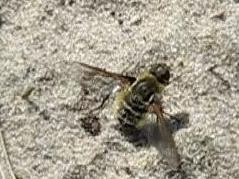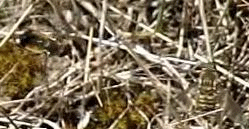Biology:Villa modesta
| Villa modesta | |
|---|---|

| |
| Vila modesta female | |

| |
| Vila modesta male | |
| Scientific classification | |
| Domain: | Eukaryota |
| Kingdom: | Animalia |
| Phylum: | Arthropoda |
| Class: | Insecta |
| Order: | Diptera |
| Family: | Bombyliidae |
| Subfamily: | Anthracinae |
| Tribe: | Villini |
| Genus: | Villa |
| Species: | V. modesta
|
| Binomial name | |
| Villa modesta (Meigen, 1820)[1]
| |
| Synonyms | |
| |
Villa modesta is a species of fly in the family Bombyliidae.[2] The larvae may feed on larvae of Lepidoptera.
Distribution
Villa modesta can be found in June to September in coastal dune areas throughout mainland Europe, in Britain and to the north in Norway.[3][4][5]
Description
Villa modesta is a fairly large fly, the body length is 10–14 mm. The body is brown. The female has pale bands on tergites 2,3 and 4. The male does not have bands but has tufts of hair at the end of the abdomen and at the base of the wings. The wings are transparent with a narrow brown front margin.
Behaviour
Like many other bombyliids, the eggs are flicked by the adult females toward dark holes. The females may be found hovering near a dark hole in the sand shooting eggs. An animation, 6 times retarded, is given here.
Every now and then the females are rubbing the abdomen in the sand in a small circular movement. Sand is necessary to make the eggs less tacky. To this end the females do have a sand chamber.[6] An animation is given here.
Courtship
The males have a choice between two strategies to gain access to a female. The males may search through the vegetation for females. When a female has been found the male will go into a hovering state near the female as given in this animation.
The males may also choose a sit and wait strategy, sitting in the sand and chasing after passing females.
References
- ↑ 1.0 1.1 Meigen, J.W. (1820). Systematische Beschreibung der bekannten europäische n zweiflugeligen Insekten. Aachen: Zweiter Theil. Forstmann. pp. xxxvi + 363. https://www.biodiversitylibrary.org/item/45915#page/9/mode/1up. Retrieved 8 July 2022.
- ↑ Evenhuis, N.L.; Greathead, D.J (1999). World catalog of the bee flies (Diptera: Bombyliidae). Leiden: Backhuys Publishers. pp. xlviii + 756 pp. ISBN 90-5782-039-0. OCLC 248444103. http://hbs.bishopmuseum.org/bombcat/. Retrieved 10 July 2022.
- ↑ Stubbs, A.; Drake, M. (2014). British Soldierflies and Their Allies: A Field Guide to the Larger British Brachycera. British Entomological & Natural History Society. pp. 528 pp.
- ↑ "Fauna Europaea : Distribution : Display Table". http://www.faunaeur.org/distribution_table.php.
- ↑ Falck M. (2009) : The Norwegian species of Villa Lioy 1864 (Diptera, Bombyliidae). Norwegian Journal of Entomology 15 December 2009.
- ↑ Yeates D.K. (1994) : The cladistics and classification of the Bombyliidae (Diptera : Asiloidea). Bull. Am. Mus. Nat. Hist. 219. AMNH, New York, NY, USA.
External links
- http://www.insect-behavior.nl/bombylidae/106-villamodesta
- "Species Villa modesta". Encyclopedia of Life. http://eol.org/pages/777939/overview. Retrieved March 22, 2016.
Wikidata ☰ Q14166561 entry
 |




